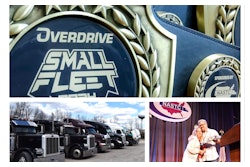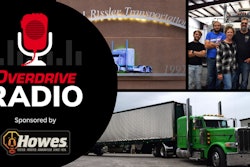Fleets large and small alike are constantly rebalancing, for lack of a better word for it, the number of trucks and their employed or leased-on operators. Big swings in that regard seem to be more and more the norm as 2025 marches on.
It can be a nightmare trying to anticipate customers' capacity needs -- consider the case of a small fleet suddenly having to park four trucks, around 60% of the fleet, after losing a contract. The owner needed to liquidate them to reduce a $200,000 debt load, all while managing the transition of his other three trucks to two different companies to which he leased himself and two company drivers.
Needless to say, the adjustments were no easy task.
The owner I’ve known for more than 15 years -- his name is John. He speaks to outright deceit from a small carrier he had a contract with for a number of years. In the aftermath of the relationship’s blow-up, with hindsight John admits there were warning signs. But being an optimistic person who wanted to believe all would work out for the best, he accepted the gradual decline in work as normal until it finally took its ultimate toll.

That carrier he worked with has gone out of business now.
Another truck owner I’ll keep anonymous. His dream of and efforts to build a five-six-truck fleet failed. To put it bluntly, he made several regrettable mistakes. What went wrong? The owner was effectively renting equipment to his drivers in hopes they might eventually take ownership themselves.
It began with a typical agreement, something akin to what you might see when financing a sale. In this case, though, these were loosely conceived agreements that involved nothing more than a verbal discussion between seller and buyer -- it happens quite often in this business.
Is this a safe way to complete a sale? If there’s no bill of sale, and the driver is making payments to you, that driver’s just renting the truck from you on a promise (and a hope) that he might own the truck later. You retain the liability of ownership (with its tax implications and everything else). While the driver can deduct his payments as an expense for his own taxes, the owner/seller has a lot to manage besides.
My colleague here on Overdrive Extra, insurance agent and contributor W. Joel Baker, has written about the potential pitfalls of expanding a small fleet this way, and a few of those pitfalls certainly hit the anonymous owner in question here. The biggest mistake was that willingness to accept payments from a driver without a real loan document, such as a promissory note. It’s a signed promise to pay, in exchange for title to the equipment, “with a lien on the title notarized and filed with the Secretary of State transferring the title to the purchaser,” using common language in definitions of promissory note.
This owner had no shortage of problems with his purchasers, many echoed in the past story by Baker, too, in part about his own past experience. One purchaser failed to maintain the truck -- the engine failed after running low on oil. My takeaway: an owner-operator can’t afford to try and be the nice guy and just hand the keys to a driver. You have zero control over the operator, and still own the risks. The deal was a complete loss for the seller in this case.
[Related: You don't get any do-overs: A word of caution about expanding by leasing on owner-operators]
What might go sideways for the truck purchaser himself in such a deal? Consider that a buyer might think they have completed the purchase, making all the agreed-upon payments expecting to receive the title for the truck. But what if the seller does not have a title without a lien? What is a purchaser going to be able to do then?
This is why all parties involved need to seek proper legal advice and contracts before any sale or purchase.
That’s to say nothing of accidents. Who owns the liability, and what will the insurance cover if the truck were to be totaled -- who receives that settlement? These are crucial considerations. With nothing more than a verbal agreement in place, who knows where the outcomes might lead.
Ultimately, I tip my hat to the anonymous owner in the above example, as he was ultimately able to persevere. In doing so, though, he reversed course entirely, continuing on with one truck as an owner-operator.
Minimize risk when selling equipment yourself: Yes, it is possible
When I sold my own truck at retirement back several years ago now, I owned it with a clean title, no liens. I spent several months advertising online before I started receiving inquiries, and nearly every single one of the people who wanted to purchase wanted to do so with financing of some kind.
If you’re thinking of a private party sale, get prepared for the promises and pleading for help -- it’s relentless. I feel fortunate to have an attorney that I can consult with regarding such matters, in order to try and avoid major mistakes and risks.
One person offered to purchase for twice my asking price if I’d only be willing to finance, and they would agree to almost any terms I wanted. That’s probably not a good indication of a potential purchaser’s ability to manage a business overall -- you can probably put the most likely outcome in the failure column.
[Related: Carriers' lease-purchase programs 'meaningful' for at least half of lessee operators]
After about four months, a couple who were owner-operators and independent contractors -- like I had been, with Landstar -- made contact, and we began with conversions about their current truck. They were searching for a way to reduce their fixed costs by replacing a leased truck with a $4,000/month payment. They wanted lower or no payments. I knew the customers this owner worked with, and made contact for references. After about four-six weeks we were able to reach an agreement. They would pay down a third of the agreed-to price and keep several thousand in their emergency savings.
We signed a loan agreement, with a lien placed on the title transferred to their name in their state and properly notarized. The new owners paid off the 40-week loan agreement in 12 weeks, and I provided the documentation of where they could remove the lien from the title filed with their Secretary of State’s office.
It sounds simple put this way, but reflecting back on it I'll suggest that becoming a truck owner feels to me to be a much simpler, easier task than selling off personal inventory. There are so many different emotional decisions to be made that could interfere with accepting that final step away from the truck, or the business as a whole.
Private-sale pitfalls for purchasers: A few final considerations
Whether you’re in the market to sell or buy, internet listings stir up reactions and judgment, even if we aren’t currently looking to make a purchase. Personal bias is a powerful influence, as friends and mentors broadcast opinions all with the best of intentions.
Every seller, and every buyer, should embrace some sense of reality to avoid costly missteps.
Key point: Private purchases may not be the deal you think they are. There are some very real differences when managing a for-sale-by-owner transaction as opposed to a dealer transaction. There’s a widespread belief I’ve observed that you can save significant money buying privately, avoiding the margins dealers and salesmen must maintain to cover expenses accrued being a dealership. Yet that’s not always the case.
You still have to do the necessary homework.
As purchasers, our natural tendency is to lean toward optimism -- if it wasn't, why would we ever want to take a seat at the table and ante up to begin the negotiating phase? Where the bidding goes from there will vary greatly person-to-person. Optimistic about the prospects for freight? That will carry a lot of weight for a purchaser -- and since the November election it’s been quite a roller-coaster ride of emotion for many, highly variable depending not only on freight-market realities but political leanings.
My previous story on the topic of negotiations highlighted how crucial it is for buyers and sellers both to get as best a sense of pricing reality as possible -- do the homework, dig out current sale prices, in this case for equipment. Overdrive sister company Price Digests' tracking of used-market value is one source I’d suggest. (A single vehicle valuation look-up there is available for less than $40. It could also help you determine the valuation needed for comprehensive/physical damage insurance coverages.)
Additional resources:
- For sellers and/or buyers, Act Research’s “State of the Industry: U.S. Used Trucks Classes 3-8” reports offer broad overviews of used-truck volume/pricing trends
- For buyers, Overdrive’s own RigDig Truck History Reports offer a truck’s title history and much more detail.
[Related: The fine art of rates negotiation in today's go-go-go freight markets]
Find more insight around preparation for and execution of retirement, likewise making truck-acquisition of -sale deals, in the "Finish Line" and "Equipment and Maintenance" sections of the Overdrive/ATBS coproduction of the Partners in Business playbook, a comprehensive manual for owner-operator careers. The 2025 PIB edition is newly accessible in this dynamic online content library format.













